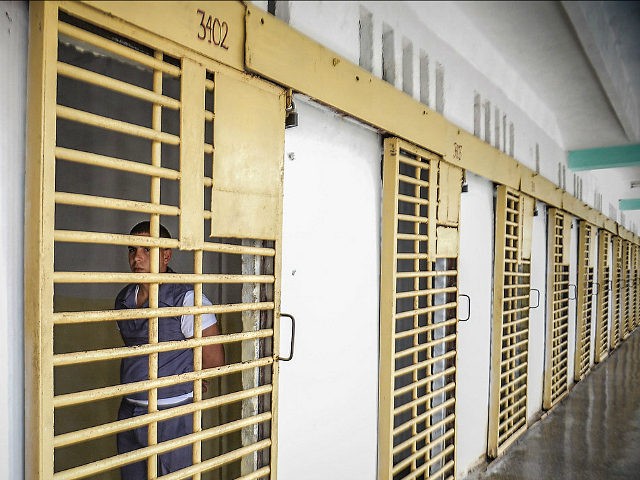The Cuban Observatory for Human Rights has identified at least 142 prisoners of conscience who will remain imprisoned this Christmas under the communist Castro regime, which resolutely denies the existence of any political prisoners on the island.
The prisoners identified are those in prisoned either charged with a crime or convicted and serving a prison sentence. Since longtime dictator Fidel Castro stepped down, leaving brother Raúl in charge, Cuba has shifted its repressive techniques to artificially deflate the number of political prisoners in the country by arbitrarily arrested known dissidents repeatedly, often on a weekly basis, and releasing them after they suffer beatings and other abuse.
The Observatory, an organization that monitors both the number of political prisoners and the number of arbitrarily arrested dissidents on the island on a regular basis, published the statistics on International Human Rights Day, December 10. Cuba has not released any of the prisoners on the list at press time.
The individuals are all anti-government dissidents, arrested on a variety of charges including desacato (“disrespect” for the government), unlawful attempts at assembly, or, often, unproven allegations of assault members of State Security. According to the Observatory, the convictions that keep the prisoners behind bars range from brand new to decades old: “the oldest political prisoners were convicted in 1991, and the most recent in 2018.” The group identified 29 prisoners of conscience condemned in 2018.
The Cuban communist regime denies the existence of political prisoners on the island. While rarely confronted with challenges to this claim, dictator Raúl Castro did answer a question about the issue in 2016, when CNN reporter Jim Acosta asked him to explain the imprisonment of pro-democracy dissidents during a press conference with then-President Barack Obama in Havana. Castro responded, “What political prisoners?” and demanded a full list of the alleged prisoners to review their status.
Secretary of State Mike Pompeo revealed in an open letter to his counterpart, Cuban Foreign Minister Bruno Rodríguez, this month that the U.S. government had done precisely that on multiple occasions since Castro’s comments: sent the Cuban regime a list of political prisoners and demanded either a valid explanation for their incarceration or their freedom.
“I am now asking you to provide a substantive explanation of the detention of the political prisoners on the attached list,” Pompeo’s letter read. “First, I ask whether your government continues to incarcerate those listed as charged with ‘pre-criminal dangerousness.’ Second, I ask for an explanation of the charges and the evidence against the other individuals.”
“The United States recognizes the sovereign right of every state to try and to convict individuals … That principle, however, does not justify the imprisonment of Cuban individuals for simply exercising their human rights and fundamental freedoms,” the letter concludes.
The list Pompeo published was far from a complete one. Instead, the State Department identified eight cases of imprisonment of particular concern, all of individuals identified with national pro-democracy groups. Among the list were three members of the Patriotic Union of Cuba (UNPACU), one of the most persecuted groups in the country, and Eduardo Cardet, the head of the Christian Liberation Movement (MCL).
Cardet’s case has received international attention for the nature of the MCL, whose previous leader, Oswaldo Payá Sardiñas, died after Cuban government agents forced his car to crash violently off a highway, an incident deemed a “car accident” in which the government rejected responsibility. The group was born as an attempt to organize a nationwide petition demanding free and fair elections. The nature of Cardet’s arrest has also alarmed the international community. Cardet was arrested in November 2016, shortly after the death of Fidel Castro. According to family and eyewitnesses, police violently assaulted Cardet in public, and in front of his children, after he refused to sign a condolence book to Castro. He received a three-year prison sentence for the incident and has suffered a decline in health in prison exacerbated by his chronic asthma and beatings and stabbings at the hands of fellow inmates.
The head of UNPACU, the former political prisoner José Daniel Ferrer, has continued to accuse the regime of targeting his group for persecution. On Monday, Ferrer wrote on Twitter that police had surrounded the group’s headquarters and that its members remained “in danger of assault.”
#Cuba Policia politica y abundantes tropas de asalto a dos manzanas de la Sede de #UNPACU. Peligro de asalto. #Ni1Más. Abajo la tirania!!!
— José Daniel Ferrer (@jdanielferrer) December 24, 2018
A coalition of human rights group have demanded not only the attention of world powers, but of the world’s religious institutions to bring justice to pro-democracy dissidents on the island. This weekend, the Coalition for a Free Cuba, a U.S.-based organization, published a letter signed by several human rights group from the Western Hemisphere and Europe urging Cuban, Venezuelan, and Nicaraguan Catholic bishops to help fight the leftist oppression of dissidents in all three countries, who remain close allies.
“We address you this Christmas to ask for your prayers and those of priests and believers under your jurisdictions to obtain freedom for political prisoners in Venezuela, Nicaragua, and Cuba, who are currently … suffering hunger, mistreatment, and disease,” the letter reads. “We would also like to ask you to do everything possible with the authorities to convince them to grant amnesty to those captive due to political reasons in their country.”

COMMENTS
Please let us know if you're having issues with commenting.